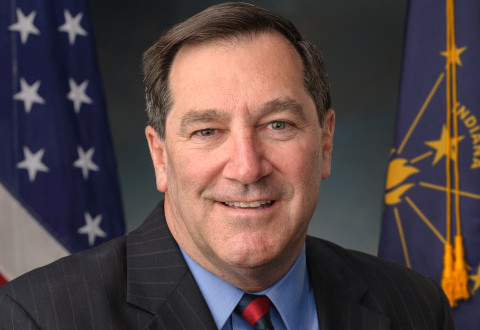Washington, D.C. – U.S. Senator Joe Donnelly today announced Taylor Nielsen of Lebanon, Indiana, as his guest to President Trump’s first State of the Union speech, scheduled to take place on Tuesday, January 30. Nielsen is a member of the Lebanon Police Department. In 2016, Nielsen arrived at a horrifying crime scene, where a young mother and her four-year old son had been murdered. The experience left Nielsen struggling with mental health challenges.
Nielsen’s openness about mental health challenges as a police officer helped advance Donnelly’s Law Enforcement Mental Health and Wellness Act, which was signed into law earlier this month. Nielsen joined Donnelly and Senator Todd Young in April 2017 to advocate for the bill.
Donnelly said, “I’m honored to have Taylor Nielsen join me at the State of the Union this year. Taylor’s courage talking about the mental health challenges she has faced is a testament to her strength and resilience. Her story helped illustrate the need for the Law Enforcement Mental Health and Wellness Act which, now that it is law, will help improve mental health programs for officers across Indiana and our country.”
Nielsen said, “First, I want to thank Senator Donnelly for inviting me to the State of the Union address. I am here with a grateful heart for Senators Donnelly and Young and Congresswoman Brooks for the bipartisan work in getting H.R. 2228 The Law Enforcement Mental Health and Wellness Act passed and to the president’s desk. I am here to thank President Trump for signing the bill that will help develop mental health resources for the specific challenges faced by law enforcement officers and save so many officers’ lives. I am one of those officers who tried to take my own life before I received the right help. It will be an honor to be in the same room with people that make such a difference for law enforcement.”
The Law Enforcement Mental Health and Wellness Act authorizes grants to initiate peer mentoring pilot programs, directs the Departments of Justice and Health and Human Services to develop resources for mental health providers based on the specific mental health challenges faced by law enforcement, and supports law enforcement officers by studying the effectiveness of crisis hotlines and annual mental health checks.
It also directs the Departments of Defense (DoD), Justice, and Veterans Affairs (VA) to confer about existing DoD and VA mental health practices and services that could be adopted by law enforcement agencies.
The legislation was supported by the Indianapolis Metropolitan Police Department, Fraternal Order of Police (FOP), Indiana State Fraternal Order of Police, the National Association of Police Officers (NAPO), the Major County Sheriffs of America (MCSA), the Federal Law Enforcement Officers Association (FLEOA), the National District Attorneys Association (NDAA), and the Sergeants Benevolent Association.






